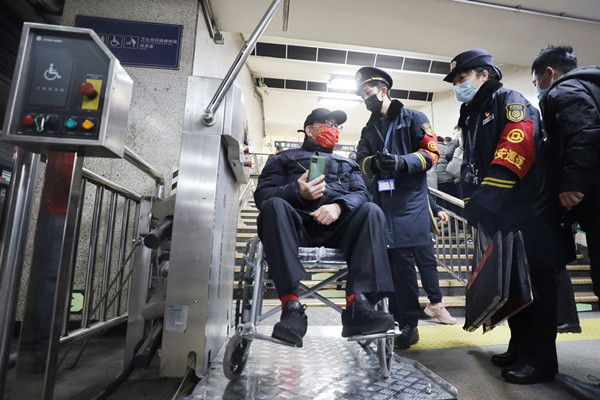Draft law to improve accessible facilities


More barrier-free equipment, areas to empower people in need, whole society
China's top legislature reviewed a draft law on building accessible facilities on Thursday, with the aim to better meet the needs of the aging population, disabled people, pregnant women and children. Observers said it's an important move to push forward China's human rights protection.
The draft law was submitted to the ongoing session of the Standing Committee of the National People's Congress, China's top legislature, for the first review on Thursday.
He Yiting, an official from the NPC Standing Committee's Social Development Affairs Committee, said that accessible facilities are of great importance to protecting the rights of the disabled and the elderly. The subject has attracted attention from the central government for a long time as it's also beneficial to the nation and individuals' all-around development.
Figures cited from the China Disabled Persons' Federation show that the nation has 85 million people with disabilities. The population aged above 60 years old was 267 million in 2021, roughly 19 percent of the nation's population, according to the seventh national census carried out last year.
According to the draft law, accessible facilities benefit every individual, but especially groups such as the disabled, the elderly, pregnant women and those carrying heavy luggage.
Specifically, county-level governments are required to give supportive policies and guidance to help families with disabled people or senior citizens to renovate their houses with accessible facilities. Allowances should also be given to these families for the renovations.
Authorities should ensure that a certain proportion of newly operated public transportation vehicles including airplanes, buses and trains, should be equipped with accessible facilities.
Operating companies should come out with replacement plans for public transportation vehicles unable to be refitted.
He said that the nation started to build accessible facilities back in the 1980s, and made progress after a State-level regulation on accessible facilities construction was released by the State Council, China's Cabinet, in 2012.
However, there is still an imbalance between the number of facilities and those needed, a shortage of management talent and an imperfect management system, he said.
"The current regulations have weaker supervisions and limits over the facilities' construction and management, which are not adapted to the current situations. We are in urgent need of a specific law on accessible facilities construction to perform centralized and unified management," he added.
He said the draft law shows the nation's resolve to respect and protect human rights. "We now have 85 million disabled people and 267 million people aged 60 and above. Also, tens of millions of people such as pregnant women, children and injured people need accessible facilities.
"Improving the construction of accessible facilities and eliminating the impediment to people's access to public transportation, information and social services can help improve their lives. It can also help secure their dignity and improve the quality of life."
He said the draft law is a response to the nation's aging population.
"Improving accessible facilities can help more people to get out of their homes and enter the job market, which can unleash the nation's potential labor force," he said.




